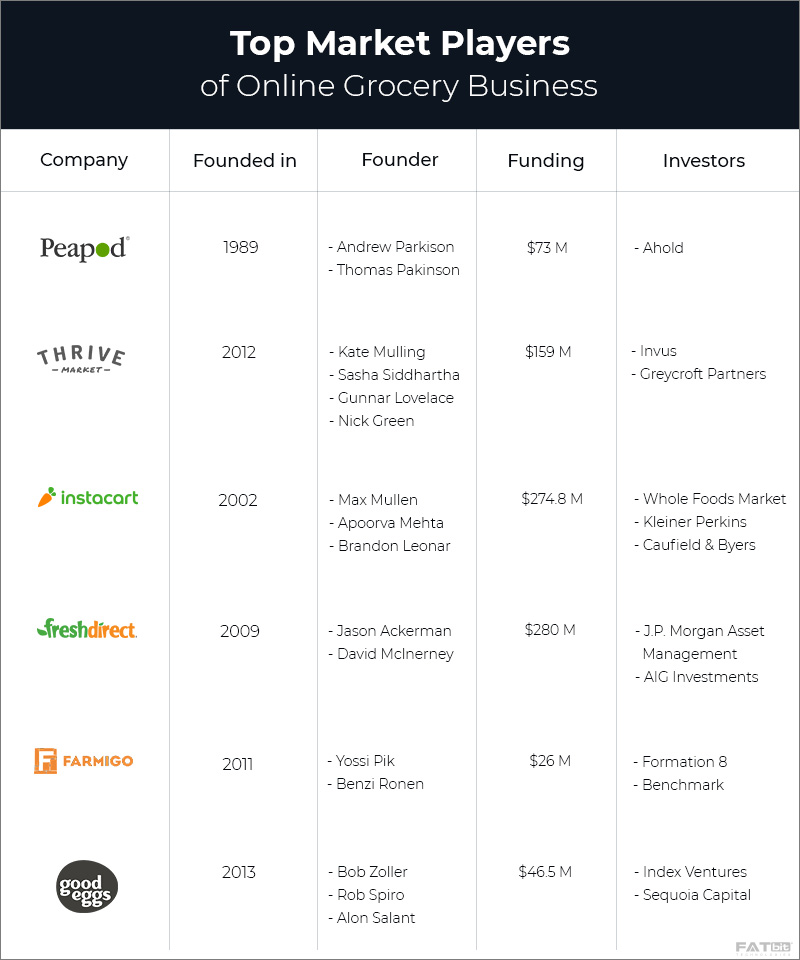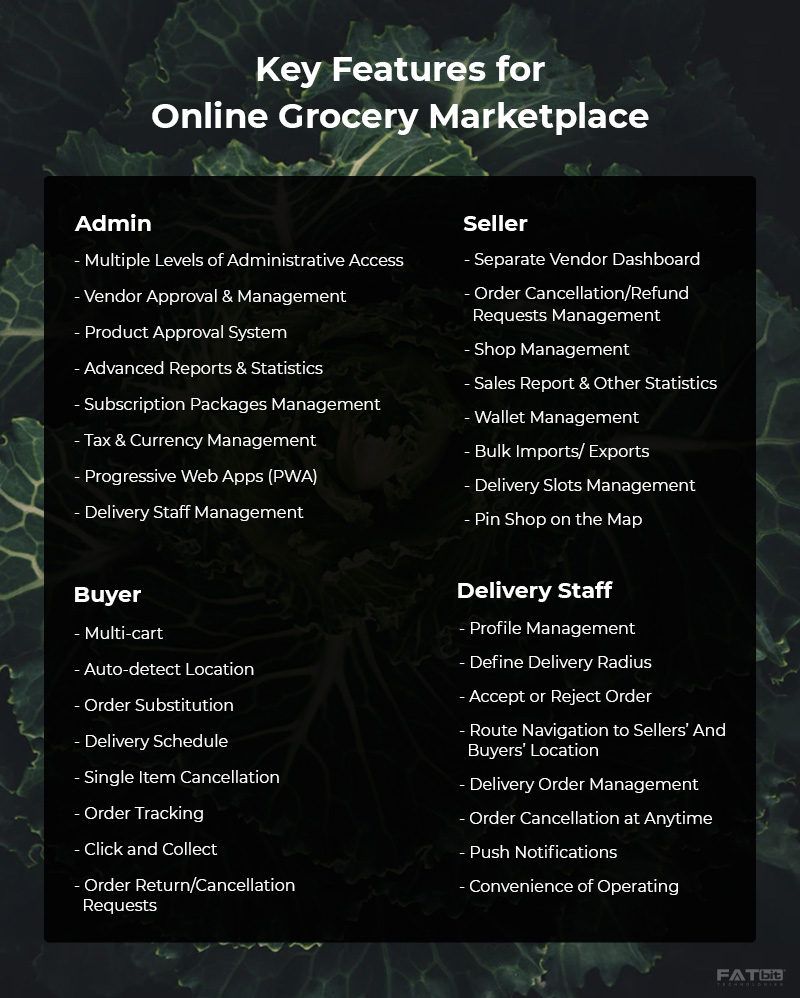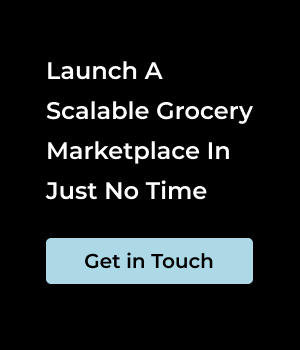Major Players of the Grocery Industry
The top retailers of grocery eCommerce industry are not only popular among customers but many aspiring entrepreneurs or business owners study their order to cash process or frameworks before starting their own grocery ordering and delivery business.
Some of the leading online grocery marketplaces are Shipt, Gopuff, freshdirect, OneCart, Zulzi, Pick n Pay, KIBSONS, GrabMart, Blinkit, beelivery, FarmBox, FarmDrop, Amazon Fresh, Peapod, Instashop, Walmart Grocery Delivery, Safeway, Kroger, Buymie,Good Eggs, Cornershop.

Things to Consider before Starting an Online Grocery Business
To get successful in starting and operating an online grocery business, you need to focus on the following factors:
- Selecting and enhancing (if required) grocery business model
- Understand the impact of COVID-19 or any of its new variants like Omicron in the target market
- Creating a roadmap to transform the business model into an agile, efficient, and a precise operating model
- Determining the target market
- Segregating the delivery regions
- Competitor analysis
- Grocery website and mobile apps
Out of all these factors, entrepreneurs or business owners often waste so much time and resources in choosing the suitable grocery business model.
To help you out with it, we have explained four major business models in the grocery industry with examples of market players.
Looking To Start Your Own Online Grocery Business
Different Online Grocery Business Models with Prominent Examples
1. Instacart: Hyperlocal Grocery Business Model
Instacart is another prominent name in the arena of grocery delivery service providers. Its unique selling point is rapid delivery. Being a hyperlocal grocery delivery platform, Instacart connects customers with personal shoppers who are responsible for door-step grocery order delivery. It works on a 3 tier customer strategy, where buyers purchase grocery orders online via the application of Instacart. The last mile is an important aspect in hyperlocal grocery business as it avoids many health concerns raised due to COVID-19 as well as its new variant Omicron.
Business model of Instacart at glance (buying and dispensing)
- Grocery Retail Partners
- Instacart Shoppers
Grocery retail partners: Grocery vendors who have a contract with Instacart to list and sell their grocery items through the platform.
Instacart shoppers: Instacart shoppers shop for groceries as per buyers’ requirements and then deliver it to them.
2. FreshDirect: Inventory Business Model
The main USP of FreshDirect is to deliver fresh groceries to its consumers. By using the FreshDirect app, customers can order groceries with the click of a button. The order is later delivered to the customer’s doorstep by a refrigerated truck. Apart from customers, grocery suppliers, and FreshDirect buyers, are the key partners of FreshDirect.
Business model of FreshDirect at glance (buying, warehousing, dispensing)
- Grocery Suppliers
- FreshDirect Buyers
Grocery suppliers: By partnering with FreshDirect, grocery suppliers supply their produce like meat, seafood, and poultry. Suppliers are also listed on the application of FreshDirect to showcase products to the relevant buyers.
FreshDirect buyers: Buyers of FreshDirect, check and purchase fresh grocery supplies from suppliers. The stock purchased is taken to the warehouse of FreshDirect. All grocery items are stored in a temperature-controlled environment at the warehouse.
A refrigerated truck later delivers the order to the consumer. As FreshDirect follows just-in-time practice, the order is prepared only after being placed by a customer. As COVID-19 shows resistance towards gradually fading away, its new variant, Omicron, further makes the just-in-time practice as well as door-step delivery a much needed practice.
3. Peapod: Multi-vendor Grocery Business Model
Peapod is one of the oldest grocery delivery services in the US. Following a hybrid approach, Peapod acts as a service provider like Instacart and an online supermarket. It offers fresh produce, meat, alcohol, refrigerated foods, meal kits, and more.
Though Peapod primarily fulfils orders through its warehouses, recently, it has partnered with grocery stores to provide delivery services. The company has ‘warerooms’ that are attached to the grocery stores where employees prepare and fill customer orders.
Operating as a multi-vendor marketplace, Peapod facilitates shipping and payments.
4. Walmart: Omnichannel Business Model
With the integration of physical and digital storefronts, Walmart provides consumers with channel engagement as per preference. It operates as an omnichannel business model. Customers are seamlessly served via the website, mobile application, and in-store interactions.
Its essential resources include brick and mortar stores, eCommerce stores, distribution and storage centres, mobile app, and human resources.
The key activity of Walmart is to buy and deliver goods. The company controls the costs involved. In addition, it invests in inventory control, omnichannel order orchestration, customer service, and distribution management. The company comprises three major categories:
- Retail
- Wholesale
- And other
Further, these categories consist of many formats: Hypermarkets, Supercenters, Supermarkets, eCommerce, warehouse clubs, and more.
Connect to Build A Feature-Rich Grocery eCommerce Marketplace
Revenue Channels in Online Grocery Marketplace
Commission on each transaction:
Admin can charge a commission on every transaction from the seller.
Vendor subscription:
A vendor has to pay a fixed amount of money to the admin in order to list, access, and sell on a grocery eCommerce platform. A vendor can choose the required subscription plan from a number of available options and can also upgrade or downgrade the plan according to his/her requirements.
Commission on delivery:
On every transaction, the admin can charge a fixed delivery fee from both buyer and delivery boy.
Secondary revenue streams:
- On-site promotion for merchants/grocery sellers
- Hosting banners ads
- Start a blog and publish sponsored content on it
- Sell useful merchandise such as jars, reusable carry bags, etc. (it will also help you in branding)
- Seller user data to market research firms
Key Features for Online Grocery Marketplace
It is essential that your grocery marketplace website is quick to load, easy to use, mobile-friendly, and has the following unique features:

Key Features to Attract Vendors & Buyers.
Below-listed are some offerings that you must include on your online grocery marketplace to attract vendors and buyers:
Crucial offerings for an online grocery marketplace to engage vendors
Shop management
This feature enables vendors to add, update, or edit their shop details such as name, address, delivery slots, operational hours, packaging time, working days, and more.
Order management
Order management option helps vendors to systematically manage multiple order requests at a single time. They can view the number of pending orders, total orders delivered, order history, cancelled orders, withdrawal requests, among other things.
Product management
This feature makes it easy for vendors to add or remove products based on the buyer’s demand and the current market scenario. They can update or edit product details and change the product status as available or unavailable.
Inventory management
Managing inventory operations without having a standardised inventory management system could be challenging. An online grocery marketplace integrated with an inventory management module helps vendors monitor their products’ stock and regularly track inventory status.
Tracking reports
Tracking and analysing sales reports on a daily basis is no longer a hectic task with this feature. Vendors can check the total earnings of their store and get daily sales updates to see the business performance.
Logistics support/delivery apps
An online grocery marketplace that comes with logistics support/delivery apps helps vendors manage logistics operations effectively. Vendors can easily deliver grocery items to buyers without any delay.
Crucial offerings for an online grocery marketplace to engage buyers
Multi-lingual
Multilingual functionality allows buyers to browse an online marketplace in their native language. Buyers from multiple regions can choose their preferred language and buy grocery items conveniently.
Self-pickups/BOPIS
It is an advanced feature that helps buyers place an order online and collect it from the grocery store or any other pick-up location.
Multi-cart
This feature enables buyers to add grocery items from different stores to a single cart and place a single order for all items at once.
Multi-payment
A multi-payment feature helps buyers to select the payment method of their choice. They should be able to complete payments via credits & debit cards, net banking, digital wallets, cash on delivery, among other options available on the marketplace.
Delivery scheduler
This feature enables buyers to schedule the order delivery as per their convenience. They can choose the preferred day and time of product delivery during the checkout process. During the COVID-19 pandemic, door-step delivery played an important role. With the delivery scheduler option, the buyer can ensure the door-step delivery of the ordered item as per his / her availability. This remains important as the world is seeing a new variant coming to light – Omicron.
Mobile app
An online grocery marketplace that comes with a buyer app makes online grocery shopping an enjoyable experience for buyers. Rather than searching for the online grocery marketplace on the web, buyers can place an order anytime and anywhere within just a few clicks through a mobile app.
Create Online Grocery Marketplace and Mobile App
How to Start an Online Grocery Business in 2024?
To launch an online grocery business in 2024, two methods can be followed:
- Build from Scratch
- Using Ready-made Grocery eCommerce Platforms
Build from scratch
To build a grocery eCommerce marketplace from scratch you will need a dedicated development team of your own or will have to hire a leading website development company. Both the cases require hours for research, development, testing and deployment. The process adds up to the time, making it expensive.
Using ready-made grocery ecommerce platforms
On the other hand, a ready-made grocery eCommerce platform is convenient and less expensive compared to the development from scratch. Ready-made grocery eCommerce platforms come with pre-integrated features and APIs, there is a one-time payment, and the time required for setups is less.
Growcer is one such readymade grocery ecommerce platform that can launch your online grocery business in a short time frame.
It also offers exemplary features and functionalities and offers a lifetime license. Equipped with readymade buyer and grocery delivery apps, Growcer is a perfect platform to launch a grocery business online without any hassle quickly.
Conclusion
Grocery consumption is the basic human need, and people are increasingly relying on online shopping. So, the online grocery business idea fits perfectly in the current dynamics, despite the above-mentioned challenges.
The important thing for entrepreneurs planning to enter this sector is to be aware of these challenges & know how to tackle them by leveraging the right technology, trends & tactics.
Discuss your grocery business requirements with our experts




Comments (34)
 Bisi Alawode
Bisi Alawode
 FATbit Chef Post author
FATbit Chef Post author
 nisha
nisha
 FATbit Chef Post author
FATbit Chef Post author
 awais mirza
awais mirza
 Deepak
Deepak
 Amna
Amna
 Deepak
Deepak
 Damon Burton
Damon Burton
 sell grocery online
sell grocery online
 sarah
sarah
 FATbit Chef Post author
FATbit Chef Post author
 Abdullah
Abdullah
 FATbit Chef Post author
FATbit Chef Post author
 RithikaValentina
RithikaValentina
 FATbit Chef Post author
FATbit Chef Post author
 Ahaan
Ahaan
 Frank Umeadi
Frank Umeadi
 FATbit Chef Post author
FATbit Chef Post author
 rishavp
rishavp
 FATbit Chef Post author
FATbit Chef Post author
 SHARMA
SHARMA
 FATbit Chef Post author
FATbit Chef Post author
 supermarket near me open late
supermarket near me open late
 FATbit Chef Post author
FATbit Chef Post author
 william scottty
william scottty
 FATbit Chef Post author
FATbit Chef Post author
 Peter
Peter
 FATbit Chef Post author
FATbit Chef Post author
 FATbit Chef Post author
FATbit Chef Post author
 Priya Anilkumar
Priya Anilkumar
 Karen Christie
Karen Christie
 Nicole Adkins
Nicole Adkins
 John
John
Thank you for the eye opening article. It provided valuable insights and infused the needed drive for the future of our business
We are glad you liked it. keep visiting us for more such posts
Cheers!
FATbit Team
thanks for sharing this article
I like your thinking and your post
Your’re welcome.
Glad you liked it!
Keep visiting us.
Regards
Team FATbit.
Hello deepak, Thanks for a great article. You make it sound very simple and do able.
Thanks, Awais!
Glad you liked the article.
Let me know if I could be of further help, in case you plan to open your own grocery store.
Best,
Deepak
Deepak, What a great read
We are launching our online grocery store in 2017 and I am pleased that I come across your article. I think yes online grocery business idea fits perfectly in market where online shopping trend is picking up. Look how fast redmart and honestbesss growing in Singapore and obviously if big basket in India can have Shahrukh Khan as brand ambassador you got to believe that online grocery startups can do well in market.
Hi Amna,
Thanks for the comment; and yes, I agree with you on all points.
I just checked your grocery store, and find it really smart that you’ve put estimated delivery frame right up on the homepage.
Let me know if you need help with the online marketing of your grocery store.
You can reach us through this link: https://www.fatbit.com/website-design-company/requestaquote.html
Best,
Deepak
Doing an online business is not that easy. Following these steps is really important in order to be successful in any online business you’ll put up. Glad to read this article.
Very interesting blog. Grocery businesses move to online and sell grocery online.
Nice. It provides very useful information for setting up grocery business. Thank you so much for sharing.
You’re Welcome!
Keep Visiting us for more such useful information.
Cheers!
Team FATbit.
Wow excellent post, very useful and insightful
Thanks for the appreciation!
Keep visiting us for more such info.
Cheers!!
Team FATbit
Thank you for sharing this articles. It is very useful for me.
You’re Welcome!
Glad you find it useful.
Regards
Team FATbit
Online Grocery Business has great future in coming years. This ideas will make new entrepreneurs aware about the challenges that might come along.
Thank you so much for this detailed article. I had to bookmark this page for a very long time because I was always visiting it to gain insights while I was building my online supermarket in Abuja, Nigeria. We launched on 19th May, 2018 and believe me, it has been a thing of success and joy.
Thank you once again for this article.
Many congratulations!
We are really glad to hear it.
You are always welcome to connect with us for any startups related projects, services and ideas.
Keep visiting us.
Cheers!
Team FATbit.
nice article
Hi Rishavp,
Thanks for the appreciation.
Regards,
Team FATbit
Good
Hi Rishav,
Glad you liked it.
Regards,
Team FATbit
really cool site
Hello,
Thank you so much for your appreciation.
Regards,
Team FATbit
Can we earn via monthly subscriptions on a grocery delivery marketplace? In your other blogs, you have mentioned it as a viable revenue stream.
Hello William, thank you for sharing your concern. Yes, the business owner of a grocery delivery marketplace can generate revenue by selling subscription packages. He can create multi-tier subscriptions for both vendors and buyers.
i want the solutions in kenya
Hello Peter,
It would be our pleasure to be at your service. Kindly send us your requirements:
Email: [email protected]
Contact No:+918591919191
OR
Fill in the form:
https://www.fatbit.com/website-design-company/requestaquote.html
Best Regards,
Team FATbit
Hello,
Thank you so much for your appreciation.
Regards,
Team FATbit
This article really helped me to know more about online grocery stores and how to build an e-commerce website.
Hi There, Karen Christie here from SpotnEats.
Nice post and beneficial for those are planning to launch an online grocery delivery business. Thanks for sharing with us!
best guide to start a marketplace for a seamless meal and grocery delivery experience.
Excellent Post !! Very well written. It has certainly answered all my queries related to grocery business.